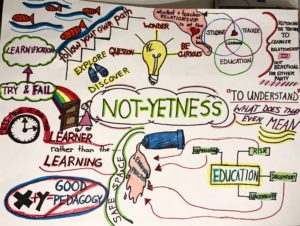I selected the Hybrid podcast “Questioning Learning” by Chris Friend and Amy Collier to analyze and reflect upon. I used a platform that was challenging yet utilizing my artistic abilities and love for visual arts, a sketchnote. This sketchnote explores the true significance of “not-yetness”. This has been a great learning curve for me, as my perspective on standardized pedagogies has changed completely. Below you will find a picture of my sketchnote, but you can click here for a video that is better quality and easier to read!
In this podcast, Amy touched on this notion of “not-yetness” and the need to ask questions about what we’re doing opposed to what are the best practices, as well as how to be more student-orientated. Through this sketchnote, I decided to show the importance of students to inquire about things, to take a risk and to deviate from the traditional school culture. Amy talked about a movement that envelops the shift from teaching to learning and how we want to be more learner-centred and based on student life- this is called the “learnification movement”. This learnification movement has allowed us to make assumptions of different inequities, hiding questions like “what is education”, “for whom”, and “why do people go through it”. We don’t ask ourselves these questions because we are so consumed with only focusing on the learning aspect. Amongst all other things, this podcast also made me reflect on the meaning of the word “understand”. Can someone truly completely ever “understand” something? I came to the realization that we should not be using this word in a learning outcome because the depths of “understanding” is an ongoing process that takes time. Amy also touched on the concept of learning outcomes and its role in regards to students. I started thinking to myself…why are we as teachers not asking ourselves “what would make me shocked and admire my students, or maybe wonder at their work”. I believe that should be where teachers start when it comes to learning outcomes. This is a piece of mind that I am forever going to take with me going into schools. It is needless to say that all learning outcomes are different with every individual student, and they should not mean that every student will be taking the same route and ending with the same route. I’ve realized the more we are willing to embrace this risk that comes along with education, the more joy and meaning there will be. Amy said, “Risk is all around us and we have to be ready to not survive but thrive”. Students should feel that discomfort of not knowing and of everything not being best practice.
I think Critical pedagogy is about asking students and teachers what makes them excited about learning, and we should take that and try to explore it, in order to create a more joyful and meaningful learning experience. There is so much more to education than just learning. When people come together, you would not believe what can be created. All of these aspects ties back to to the concept of not-yetness. It involves not satisfying every condition, not fully understanding something, not check-listing everything, not tidying everything, not trying to solve every problem…but creating space for emergence to take us to new and unpredictable places, to help us better understand the problems we are trying to solve.

